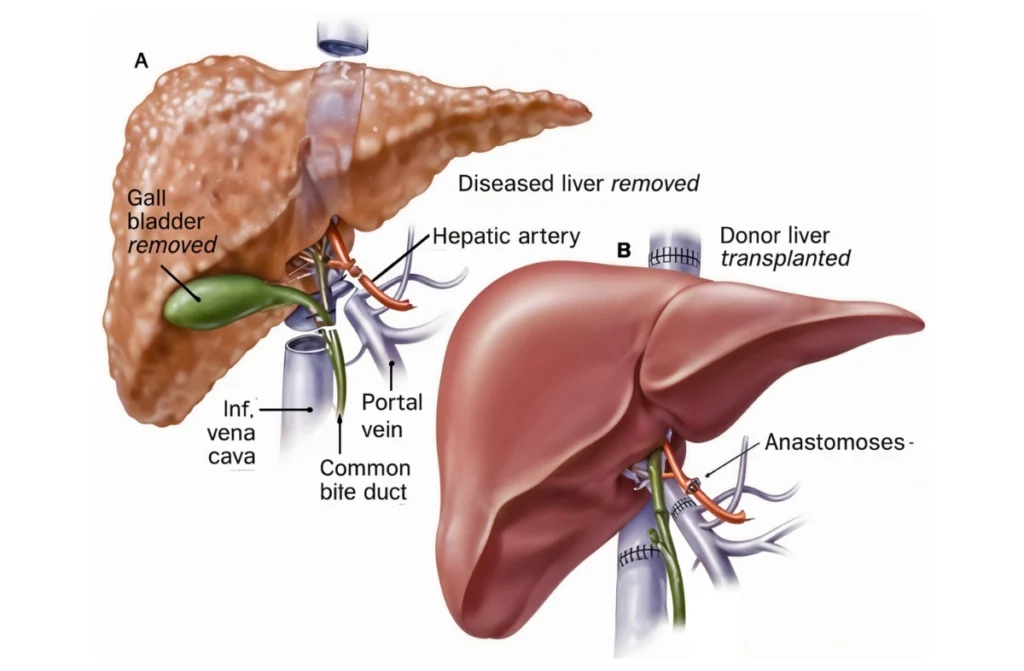Liver transplant recovery in India is a critical phase in ensuring the success of the surgery. India has become a global hub for liver transplants, offering world-class care and cost-effective treatments. This blog covers everything you need to know about liver transplant recovery in India, from post-surgery care to long-term prevention and lifestyle changes.
Who Needs a Liver Transplant?
A liver transplant is recommended for patients with severe liver conditions that cannot be managed with medication or other treatments. Some common conditions that may require a transplant include:
- Liver Cirrhosis – Chronic liver damage due to alcohol, hepatitis, or fatty liver disease.
- Acute Liver Failure – Rapid liver deterioration due to viral infections, toxins, or drug overdose.
- Hepatitis B and C – Advanced viral infections leading to liver failure.
- Liver Cancer – Certain cases where cancer is confined to the liver and not spread to other organs.
- Genetic Disorders – Conditions like Wilson’s disease or hemochromatosis affecting liver function.
If you or a loved one has been diagnosed with any of these conditions, consulting a specialist is essential to determine the right course of treatment.

What Happens After Liver Transplant Surgery?
After a liver transplant, the immediate focus is on ensuring the new liver functions well. Here’s what happens:
- Post-Surgery Monitoring: Following the 1st liver transplant in India, comprehensive monitoring has remained a cornerstone of post-transplant care. Patients recovering from a liver transplant undergo meticulous observation to detect early signs of infection, organ rejection, or other complications. This includes routine blood tests, imaging studies, and detailed physical examinations to ensure the transplanted liver is functioning optimally. India’s advanced medical infrastructure continues to uphold the highest standards of liver transplant aftercare in India, ensuring superior patient outcomes.
- Hospital Stay: During the critical initial phase of liver transplant recovery in India, patients typically remain hospitalized for 10-14 days under the close supervision of skilled medical professionals. This period is vital for stabilizing vital signs, managing post-surgical pain, and supporting the body’s healing process. The hospital stay also allows healthcare providers to educate patients and their families on liver transplant aftercare in India, facilitating a smooth transition to home-based recovery and long-term well-being.
- Medications: Immunosuppressants play a crucial role in liver transplant recovery in India, preventing the immune system from rejecting the new liver. These medications are carefully administered, with dosage adjustments based on individual responses. Additionally, antibiotics, antifungal, and antiviral drugs are prescribed to prevent infections, reinforcing prevention after liver transplant in India as a fundamental aspect of postoperative care. These protocols, developed and refined since the 1st liver transplant in India, continue to enhance patient recovery and long-term transplant success.
Liver Transplant Surgery Recovery
The recovery phase is gradual and can take several months:
- Initial Recovery: Patients start feeling better within a few weeks.
- Full Recovery: It may take 3-6 months to fully recover.
- Proper medications and follow-ups are crucial for liver transplant recovery in India to be successful.
Liver Transplant Aftercare in India
- Routine Checkups:
- Weekly follow-ups are necessary during the first few months of recovery.
- Blood tests to monitor liver function are part of the process.
- Cost-Effective Care:
- Many international patients prefer liver transplant aftercare in India due to its affordability and quality.
What Kind of Follow-Up Care Will I Have During Recovery?
Comprehensive Monitoring
- Regular follow-up appointments are essential for tracking the progress of your recovery.
- During these visits, doctors perform blood tests, imaging scans, and physical examinations to assess liver function and identify potential complications such as infection or rejection.
- India’s leading transplant centers prioritize detailed monitoring, ensuring timely interventions when needed.
Medication Management
- Patients are prescribed immunosuppressants to prevent the immune system from rejecting the new liver. These medications are carefully monitored and adjusted based on blood test results.
- Additional drugs, including antibiotics, antifungal, and antiviral medications, are often provided to reduce the risk of infections, emphasizing prevention after liver transplant in India.
Nutritional Support
- Diet plays a vital role in recovery. Nutritionists provide tailored meal plans that promote liver health and overall healing.
- Foods high in protein and essential vitamins are encouraged, while alcohol, fatty foods, and raw seafood are strictly avoided.
Lifestyle Modifications
- A healthy lifestyle is integral to a successful recovery. Patients are guided on exercise routines, stress management techniques, and avoiding harmful habits like smoking or excessive alcohol consumption.
- Following these recommendations ensures improved quality of life and supports long-term liver function.
Prevention After Liver Transplant in India
To prevent complications, focus on:
Avoiding Infections
- Always wear masks in crowded places: Wearing a mask is essential to minimize the risk of exposure to airborne pathogens, especially in public spaces like markets or hospitals. This is particularly crucial during the initial recovery phase when the immune system is suppressed, making the body more vulnerable to infections.
- Practice good hand hygiene: Regularly washing hands with soap and water or using an alcohol-based hand sanitizer reduces the chances of introducing harmful bacteria or viruses into the body.
Healthy Living
- Maintain a balanced diet and regular exercise routine: A nutrient-rich diet helps support liver function and overall recovery, providing essential vitamins and minerals needed for tissue repair and immune support. Complementing this with light to moderate exercise promotes circulation and aids in maintaining a healthy weight, reducing strain on the new liver.
- Stay away from alcohol and smoking: Avoiding alcohol is non-negotiable, as it can severely damage the transplanted liver and impede recovery. Smoking not only harms overall lung function but also introduces toxins that can interfere with healing and increase the risk of complications.
Preventive measures are integral to ensuring prevention after liver transplant in India.
Other General Precautions
- Take all prescribed medications without fail.
- Keep all follow-up appointments.
- Monitor for signs of complications like fever or jaundice, which can hinder your liver transplant recovery in India.
Self-Care at Home: Road to Recovery After Liver Transplantation
- Create a clean and restful home environment.
- Engage in light physical activity as recommended.
- Stay hydrated and eat nutrient-rich foods to support recovery.
Diet and Nutrition
- Focus on high-protein foods like fish, eggs, and legumes to repair tissues.
- Avoid raw or undercooked foods to minimize the risk of infections.
- Limit sodium intake to prevent swelling.
- Proper nutrition plays a significant role in liver transplant recovery in India.
Other Lifestyle Changes
- Physical therapy can help rebuild strength and stamina.
- Emotional well-being is equally important. Joining a support group can ease mental stress.
- Long-term adjustments in lifestyle ensure a successful liver transplant recovery in India.
What Are the Possible Complications That May Arise After the Transplant?
While most transplants are successful, some complications may include:
- Rejection of the liver by the immune system.
- Infections due to immunosuppressant medications.
- Issues with the bile duct, requiring further procedures.
Awareness and timely management are vital for safe liver transplant recovery in India.
The Role of Expertise in Recovery
- Multidisciplinary Approach to Care: Expertise plays a vital role in ensuring successful outcomes after a liver transplant. A skilled team comprising surgeons, hepatologists, anesthesiologists, and nurses ensures precise surgical execution and personalized postoperative care. This expertise shortens recovery time and improves long-term health outcomes, making liver transplant recovery in India more effective and structured.
- Advanced Technology and Facilities: Leading hospitals in India use advanced surgical tools, 3D imaging, and robotic-assisted techniques that improve precision. These advancements minimize complications, shorten hospital stays, and directly impact the cost of liver transplant recovery in India, as fewer complications reduce long-term expenses.
- Patient-Centered Rehabilitation: Specialized care plans are created based on the patient’s unique medical needs. These include physiotherapy, nutritional guidance, and psychological counseling. Such holistic recovery pathways make life after liver transplant in India healthier and more sustainable.
- Higher Success with Living Donor Options: Expertise ensures greater safety in Living donor liver transplantation in India, where both donor and recipient are monitored closely. With better compatibility and precise surgical execution, long-term survival rates improve significantly. Expertise is the key factor that ensures safe surgeries, faster healing, and an enhanced quality of life.
What Influences Life Expectancy After a Liver Transplant?
- Your Overall Health Before Surgery: Patients in good health before surgery tend to recover better and enjoy longer survival. Absence of comorbidities like kidney disease, diabetes, or infections improves results. A strong immune system and stable health conditions ensure a smoother liver transplant recovery in India, reducing complications and long-term costs.
- The Donor Liver’s Quality: The quality and health of the donor liver directly influence recovery and survival rates. In cases of Living donor liver transplantation in India, livers are sourced from relatives, ensuring better compatibility. Healthy donor organs are linked with fewer rejection risks, leading to improved outcomes and longer life after liver transplant in India.
- The Surgical Team’s Skill: A highly experienced surgical team ensures precise transplantation, reduces risks of complications, and boosts survival rates. Their ability to manage complex cases minimizes hospital stays, lowering the liver transplant recovery cost in India. Skilled surgeons, combined with modern technology, play a direct role in ensuring better long-term results.
- Post-Surgery Care and Monitoring: Regular follow-ups, medication adherence, and lifestyle modifications are essential. This ongoing care determines the success of the transplant and the total cost of liver transplant recovery in India. Patients who follow medical advice strictly often enjoy longer survival rates and better quality of life.
What’s the Outlook After a Liver Transplant?
- Improved Quality of Life: After a transplant, many patients regain energy, appetite, and vitality, significantly improving life after liver transplant in India. Daily activities become manageable, and patients experience reduced fatigue and illness. These improvements mark the success of liver transplant recovery in India, allowing patients to return to productive lifestyles.
- Financial Factors in Recovery: The liver transplant recovery cost in India depends on post-surgery medication, hospitalization, and follow-up treatments. Patients should be prepared for recurring expenses related to immunosuppressants, which prevent organ rejection. Proper planning ensures that the cost of liver transplant recovery in India does not become overwhelming for families.
- Long-Term Survival and Success: Medical advancements have improved survival rates significantly. In particular, Living donor liver transplantation in India offers higher compatibility, quicker recovery, and reduced risk of organ rejection. With structured monitoring, patients can live healthy, fulfilling lives for decades after the surgery.
- Commitment to Healthy Living: A healthy lifestyle, strict medication routines, and routine checkups are essential for long-term well-being. Patients who remain disciplined often experience better outcomes and lower risks. By following these practices, life after liver transplant in India becomes stable and rewarding.
Conclusion
Liver transplant recovery in India is a journey that requires commitment, proper medical care, and a healthy lifestyle. From immediate post-surgery care to long-term prevention and aftercare, following the right steps ensures a successful recovery. India’s expertise in liver transplants makes it a preferred destination for patients worldwide.




